Despite cell phones and smartphones being the trend, landlines have not lost their golden charm. With 100 million home phones in the U.S, many businesses and seniors still prefer landlines over their modern successors because of reliability, exceptional call quality, and security.
However, with the large telecom carriers retiring copper wire service, many people fear they will lose their beloved landline forever. Switch to Community Phone to continue using your home phone.
Community Phone is the number one choice for home phone service in the United States. Its base connects to local cell towers in your area, eliminating the need for internet or copper wire connections.
The base has a built-in 26-hour backup battery that works during power outages. The simple plug-and-play setup only takes 30 seconds to complete yourself - no installation or technician required.
Community Phone offers coverage across 99% of the United States, even in areas where traditional landline providers are cutting copper cables.
Community Phone’s home phone service is 31-35% cheaper than traditional and digital landlines, 20-25% cheaper than VoIP, and a whopping 73% cheaper than a cell phone.
Read on to learn more about landlines as well as the best alternatives if you're looking to replace yours.
Advantages of Landlines
Although it may seem as though cell phones have fully eclipsed landlines in terms of usage and popularity, the old-fashioned home phone still has a few advantages over its modern successor.
1. Reliability for Emergencies
Landline phones are great at doing what they're meant to, place and receive calls. A landline phone is capable of patching you through to other numbers at almost any time and under any circumstance, provided it's physically connected to the network.
Unlike cell phones, which can't function if the power is cut off for days on end, a landline phone will still work fine in a blackout.
Learn more about the Community Phone base, which comes with a 26-hour battery backup, so your home phone can work even during a power outage.
2. Call Quality
Although wireless and VoIP infrastructure has come a very long way in the last few years, consistent call quality remains a major concern for wireless callers everywhere.
Being able to count on excellent call quality makes landlines a fairly attractive choice even today, when cell phones have become ubiquitous.
Although cell phone reception is normally reliable in most metropolitan areas and suburbs, more rural locations can lose connectivity quite quickly. In fact, some sources state that even Verizon's cellular network, the largest in the US, effectively covers only 70% of it. This means users in many areas are ill-equipped to rely solely on a cell phone.
Community Phone has combined the best of both worlds for you through a revolutionary home phone service that does not need internet or copper wire to function.
3. Security
Landlines are safer and more secure than internet-based phones. Internet-based (VoIP) phones are vulnerable to breaching and hacking and many people, especially seniors, end up being unwitting victims of such breaches and hacks.
Since VoIP-based phone calls go over the internet, which is a huge network, your calls can be easily tapped into, hacked, manipulated, and utilized against you. The technology to make VoIP-based phone calls is still unfolding now, and it may be quite a while before conversations on internet-based phones become secure.
Landlines are not vulnerable to the dangers of tapping or hacking, as the communication switch through which your call travels is closed until a call is finished. This ensures privacy and security of your communication.
Call our Specialists to know more about the Community Phone home phone service TODAY!
Disadvantages of Landlines
Landlines have been losing ground to new communication technologies for a while, leading many to seriously consider dropping their phone service altogether, in favor of existing alternatives.
Here are a few reasons landlines have begun falling out of favor:
1. Long Distance Equals Large Bill
Landlines may still win when it comes to continuous uptime and crystal clear call quality, but they are a woefully poor choice for placing long-distance calls.
With most landline services, every long-distance call you place can turn out to be very costly. Despite technology having progressed quite a bit since the humble landline phone was adopted, the costs of transmitting calls over large distances have not decreased by much.
Community Phone offers unlimited nationwide calling at NO extra charge.
Want to know more about Community Phone? Click the button below.
2. Telemarketing Spam
Unlike cell phone numbers, which are illegal for telemarketers to call, landline numbers are open to spammers for unsolicited calls of all kinds. Telemarketers target home phones indiscriminately in many cases, causing many users to resort to using special services and devices to rid their numbers of such nuisances.
Services such as Nomorobo exist entirely to help phone users deal with annoying telemarketing calls. Receiving daily marketing calls can be very frustrating and distracting, and it's something that cell phone users don't have to deal with.
3. Lack of Convenience
This is pretty self-explanatory — landlines lack the kind of convenience that cellular networks have come to offer.
Armed with nothing but your smartphone, you can easily stay connected with family, friends, and coworkers wherever you are. A landline is always stuck at a fixed location, whether it's your office or your home, making it inconvenient for daily communication on the go.
But, the flip side to this is that many seniors do not like cell phones or smartphones as they cannot figure them out. Learn more about how Community Phone is the best home phone service for seniors in the U.S.
A New Wireless Home Phone Service - Community Phone
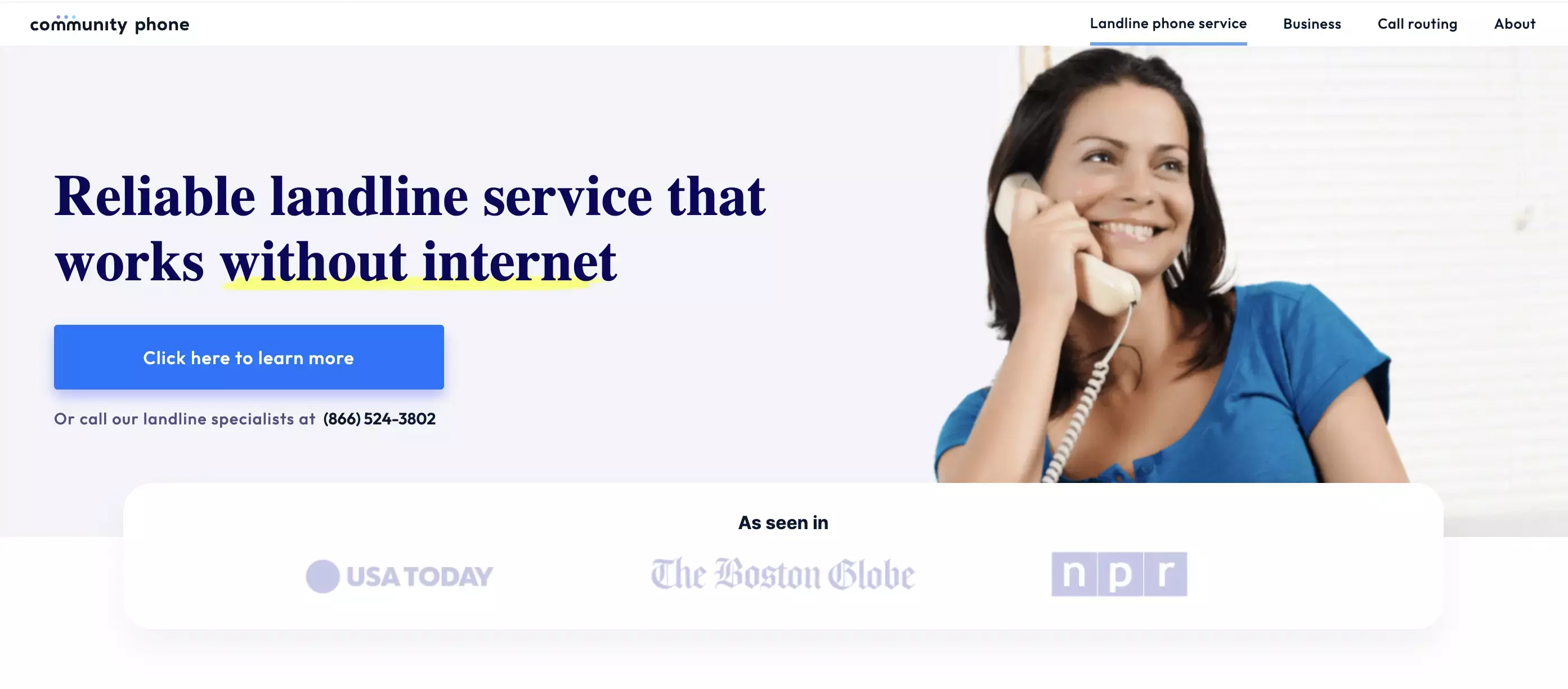
Problems with traditional landlines will increase in the coming days as FCC order 19-72 allows telcos to retire copper wire landlines nationwide. Lines laid down in the 80s and 90s would have deteriorated, giving rise to several issues. Maintenance and support requests may fall on deaf ears as companies do not want to invest in copper wire infrastructure anymore and want customers to upgrade to an expensive bundle or VoIP-based internet phones.
Bundled landline connections are not affordable options for everyone, and VoIP-based phones are unreliable, go down with network or power outages, and are dependent on high-speed internet.
Enjoy unlimited nationwide calling at affordable prices and an automated, robust call blocker that blocks over 6 million unwanted calls by switching to Community Phone. Read on to learn more!
Community Phone - The Best Home Phone Alternative
Community Phone is the best wireless home phone service in the US, fighting to keep the landline alive. Their wireless base connects your phone to cell towers in your area to ensure solid coverage and excellent voice quality. The unique base and the 26-hour battery backup ensure you stay connected in rural and low-reception areas and during power outages.
Enjoy unlimited nationwide calling and outstanding features like call forwarding, voicemail-to-email, spam call blocking, custom dial menu, call routing, and much more at affordable prices. Read on to learn more!
How It Works
Community Phone Features for Households and Businesses
Here is an overview of some Community Phone features that can be used by households and businesses alike:
1. Call Forwarding
Forward calls from your home phone to another number of your choice when you cannot answer calls from your home phone. You can choose conditional call forwarding and program multiple phones in your home or business to ring simultaneously, enabling you to answer calls wherever you are. Or, you can forward calls to your cell number if you have to run an errand and can't answer your phone when working from home.
2. Spam Call Blocking
Americans receive an average of 12 spam calls weekly, exposing them to fraud, identity theft, and phone scams. Protect yourself and your loved ones from unwanted calls with the Community Phone spam call-blocker that can block over 6 million spam calls.
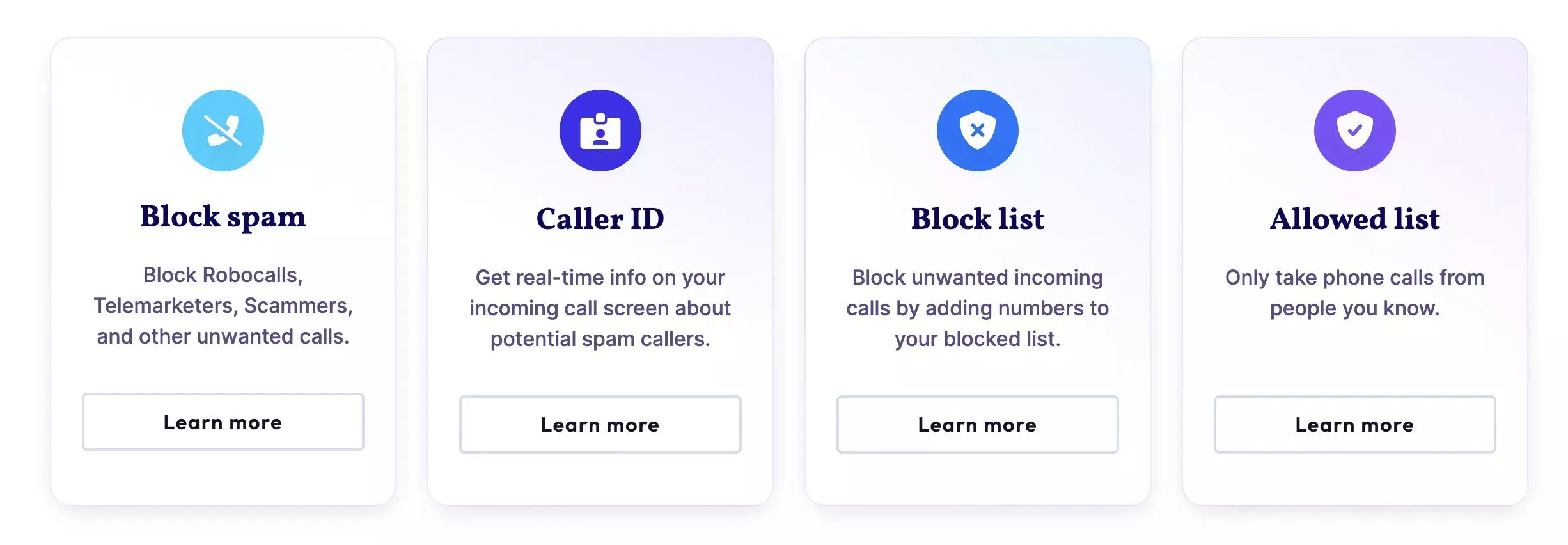
3. 3-way Calling
Speak with 2 or more of your loved ones on a 3-way call and share precious moments. If you are an employee working from home, use this feature to collaborate with team members and colleagues without worrying about patchy video calls or internet bandwidth.
Enhance customer satisfaction by patching the most appropriate person to help an irate customer with the 3-way calling feature. The possibilities are endless!
4. Voicemail
Never miss an important call from your loved ones or office with the voicemail feature. Configure the Community Phone voicemail box that can hold up to 30 messages of 3 minutes limit each to respond to important messages.
5. Home Phone Texting
Stay connected with loved ones, colleagues, employees, or customers with the home phone texting feature that lets you text any number you choose. 2-way messaging lets you see the recipient’s texts and engage with them.
If you are a business, you can use phone texting to engage your customers, wish them on special occasions, send out poll surveys, and inform them of offers and discounts. The possibilities are endless with the Community Phone unlimited texting feature.
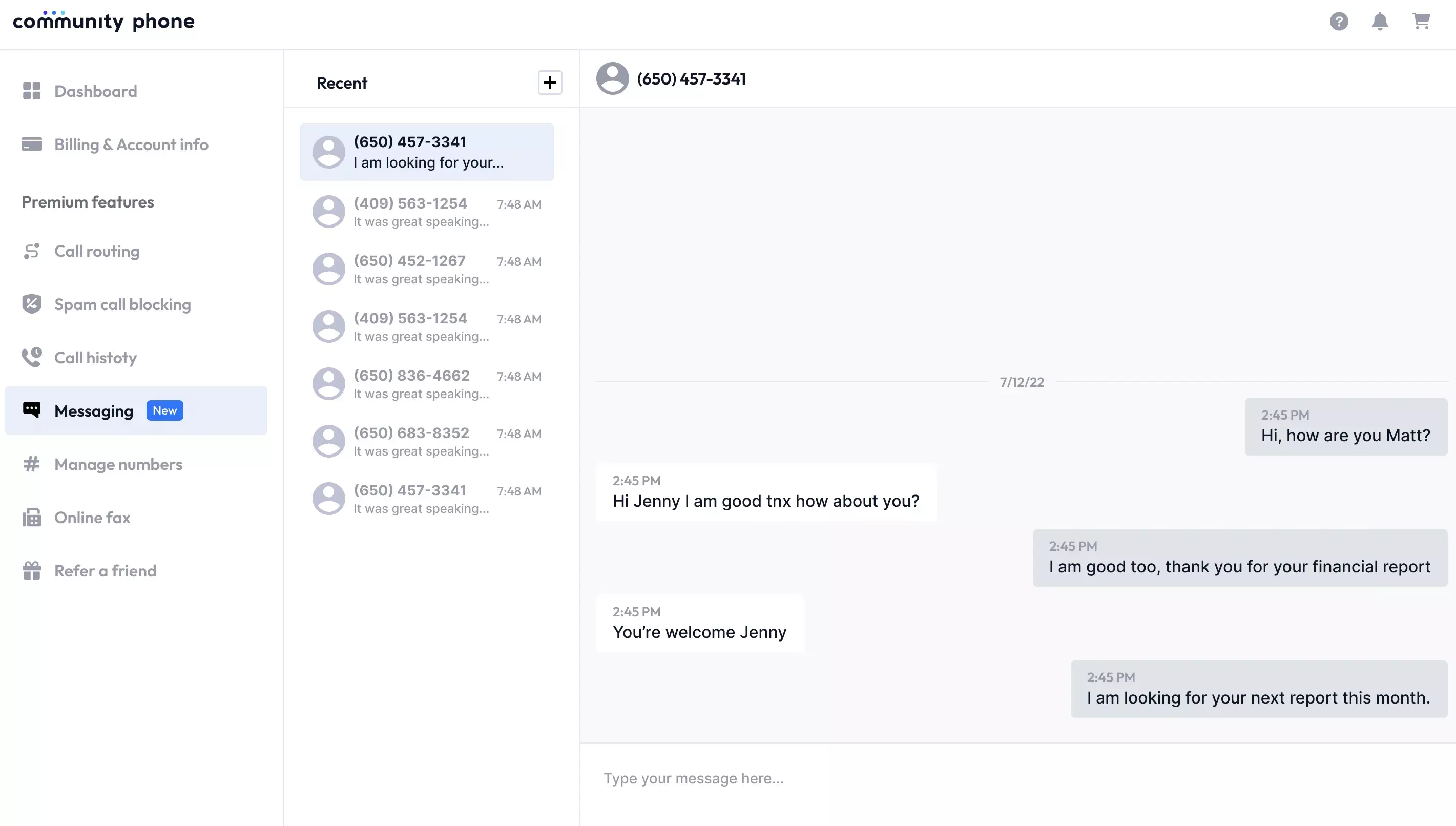
6. Call History
Enable the call history feature and access information on incoming and outgoing calls to and from your Community Phone home phone.
You can use this feature to
- Return missed calls from known contacts
- Store legitimate contacts
- Check caller information against known contacts
- Send a message or
- Block spam calls.
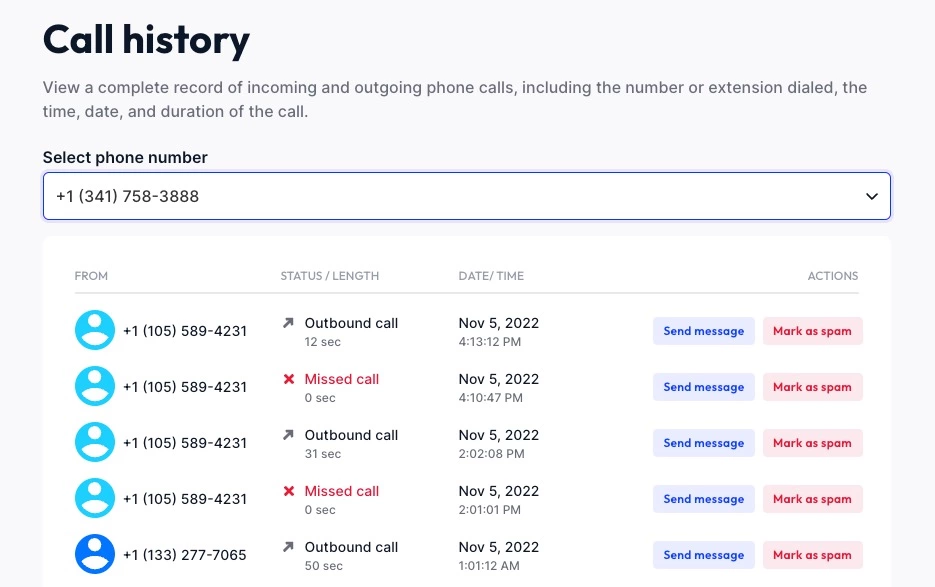
Benefits of Switching to Community Phone
Here are the benefits of switching to Community Phone's home phone service:
1. Unlimited nationwide calling: Stay connected with loved ones without fearing a massive bill or running out of talk time. Collaborate efficiently with your team without relying on unreliable free calling apps when working from home.
2. Does not need internet: Community Phone's wireless home phone service does not need high-speed internet as it works off cell towers. This future-proof technology allows you to transit from your copper lines and steer clear of unreliable VoIP phone services.
3. Connectivity during power outages: The 26-hour backup battery in the base ensures your phones continue to work during blackouts or power outages, unlike VoIP phones.
4. 24/7 reliable customer support: Connect with a live rep (not a bot) when you contact Community Phone through their omnichannel support - phone, email, or chat.
5. Quick and straightforward DIY installation: Gone are the days you had to wait for technicians and buy copper cables to have working phones. Set up the Community Phone home phone in under 30 seconds and save time and money on technician-led installations.
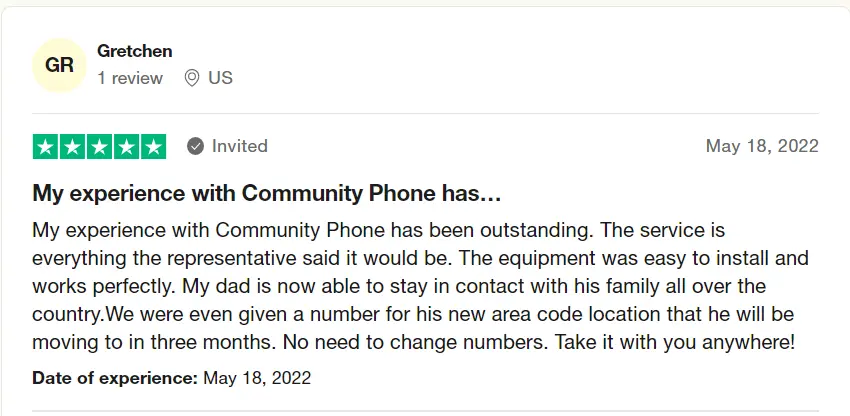
Three Main Landline Alternatives
Landline phones have quite a lot of competition these days. The alternatives covered below outclass the old technology in several ways, but they're not necessarily better on every front.
1. Cell Phones
As some of the most widely used devices on the planet, cell phones are enjoying their heyday right now. Here are a few reasons for their popularity and some drawbacks to using them:
Advantages
1. Constant Access
Landlines may be more stable in the event of a power outage, but cell phones excel where landlines can't — away from home.
No matter where you go, your cell phone can travel with you and be put to use. You might not have perfect reception at every location you frequent, but being able to place a call from a crowded train just as easily as you can in your living room can make a huge difference under certain circumstances.
If you need constant access to your phone while you're out and about, then a cell phone can't be beaten.
2. Additional Features
Landline phones are pretty basic when it comes to features and functionality. They can handle calls and voicemail, but not much else. A cell phone, on the other hand, offers much more than just voice calling. In fact, this is probably one of the least-used features among younger cell phone users.
Modern cell phones can do everything from video chatting to browsing the internet to taking professional-looking photos. Even so-called "dumb phones" with limited features can still send text-based messages and entertain you with games when you get bored. A
Disadvantages
1. Pricing
The wide variety of cell phones currently on the market makes it easy to find one with a feature set that makes sense for your needs. However, unless you decide on a basic dumb phone, a modern cell phone is likely to set you back a bit.
In 2020, the average price of a consumer smartphone exceeded $500, and that number is expected to climb higher in the coming years. Picking a cell phone over a landline option is likely to cost you close to that figure unless you opt for a special deal through your service provider, which might lower the price by half or more.
2. Distractions
Though cell phones are free from the annoying tactics of telemarketers, they can still become a distraction to their owners. In fact, the variety of tools, games, and functions that your cell phone offers can easily turn against you.
Constant notifications from your smartphone apps can break your focus throughout the day and lure you to check your phone — in fact, according to King Online University, the average person actually taps, swipes or clicks on their phone a total of 2,617 times every day.
3. Cost Estimates
As mentioned above, a new cell phone doesn't come cheap. mHowever, cell phone services can save you a lot of money if you need to place frequent long distance calls.
A single line on Verizon's Start Unlimited plan currently costs $70 per month with no additional overage fees for long distance calls, texts, or internet data use. Similar offers are available with varying degrees of coverage from other providers.
2. Voice Over Internet Protocol (VoIP)
VoIP is an internet-based approach to communication technology that does what landlines have done for so long — handle incoming and outgoing calls. VoIP systems accomplish the same things as landlines, with a few important differences.
Unlike traditional landlines, VoIP phones connect to the internet, either wirelessly or via ethernet cables. However, it is possible to use landline phones in a similar way with the help of adapters (more on this below). Similarly, software applications called "softphones" enable computers to place and receive calls through a VoIP connection.
Some companies that offer their own VoIP network services include AT&T, 8x8, Vonage, Microsoft, and Ooma.
Advantages
VoIP is great for those looking for a simple solution to replace their traditional landline service. Here are some of the benefits:
1. Inexpensive to Scale
Many call centers and corporations have migrated to VoIP solutions over the last few years, and for good reason — it costs quite a bit less to scale their operations using this technology than it would using a traditional landline setup. However, even home users can benefit from VoIP savings. Entirely online offerings can run right on your computer and are competitively priced compared to landline alternatives.
2. Very Portable
With a VoIP service, it's possible to keep up with calls from any device that has an internet connection. This allows you to take your home phone number with you wherever you go, even if you change addresses.
Disadvantages
Not everything about VoIP is ideal. Here are a few of the disadvantages compared to other options:
1. Quality Depends on Internet Connection
If your internet connection frequently becomes congested or slows down, then your VoIP calls will suffer. Typically, a slow internet connection results in poor audio quality, but it can sometimes lead to calls dropping off entirely.
VoIP handsets are tied to both your internet connection and the power grid. If either of these fail, you'll be unable to place any calls until they come back online.
2. Fewer Safety Features
In the event of a power outage, your VoIP phone will not work at all. However, there is another security issue that VoIP phone users face: a lack of emergency service location tracing.
Due to the nature of VoIP technology, it's much more difficult for emergency service providers to track your location when you call 911. Without knowledge of your location or the ability to indicate where you are in an emergency, dispatchers will be unable to locate you if you call via VoIP.
3. Cost Estimates
The typical cost associated with VoIP service for a single user ranges from $11 to $56 per month.
3. Analog Telephone Adapters (ATAs)
As mentioned above, your old analog phone can actually still be used over the internet if you choose to ditch your landline altogether. All that's needed is an analog adapter.
There are various types of adapters available that feature the necessary FXS ports needed to get your old phone online. They also offer varying compatibility with many major VoIP providers.
The most common options currently available are the following:
- Single FXS - Capable of connecting a single device.
- Dual FXS - Capable of connecting two devices at once.
- FXS/FXO - Capable of connecting one device and a landline "FXO" cable for normal landline use.
- Built-In Router Models - Equipped with router modules and ports for multi-machine access.
Some companies that offer analog telephone adapters include Cisco, Patton, Polycom, Grandstream, Obihai.
Advantages
Analog phone adapters are great for users who like their familiar physical phone systems, but want to adopt VoIP technology as well. Here are some advantages and disadvantages to installing your own:
1. Improved Call Quality
Thanks to built-in features like jitter buffering and echo cancellation, minor call quality nuisances that VoIP users can sometimes experience are noticeably improved when an analog phone adapter is used.
2. Compatibility With Fax
Although faxing isn't too common nowadays, it's still used sometimes, and those who need to use a fax machine with a VoIP connection can still do so with most analog phone adapters.
Disadvantages
1. Limited Features
Besides the disadvantages covered above for VoIP connections, your analog adapter will naturally be limited in terms of the features it can offer due to the phone it's connected to.
Using an adapter to connect your old landline phone to a VoIP service may enable you to keep using your favorite device, but it doesn't give you access to any of the more modern features of VoIP technology, such as video conferencing and multimedia messaging.
2. Cost Estimates
VoIP analog adapters range in price from $20 to $350 or more. Pricing is largely determined by the amount of ports and additional features that your chosen adapter comes with.
While landlines do have their benefits, there are several alternatives available these days that are definitely worth considering. Cell phones, VoIP, and analog telephone adaptors are all great options depending on your specific needs.
Landline FAQs
1. Are landlines obsolete?
No, landlines are not obsolete. They are a daily necessity for over 65% of senior citizens across the United States. In addition, over 40% of U.S. households still use a landline.
At present, Community Phone is the best home phone service in the United States. Its revolutionary wireless home phone service connects to cell phone towers in your area, eliminating the need for copper wires or an internet connection.
2. Do people still use landlines?
Yes, people still use landlines. Over 65% of senior citizens across the U.S. rely on landline phone service to communicate with family and friends. Meanwhile, 40% of households within the United States still have an operating landline.
Community Phone’s innovative wireless home phone service has enabled households to continue using their home phones without the need for copper wires or an internet connection.
Click here to learn more.
3. Landline vs cell phone, which is better?
When it comes to landlines vs cell phones, a landline phone is regarded to be the better, more reliable method of communication. Several studies suggest that the sound quality and clarity of landline phones are superior to that of any cell phone.
When not have the best of both worlds with Community Phone’s cutting-edge home phone phone service? It allows phone users to have the reliability and sound quality of a landline, paired with the flexibility of a cell phone.
Call 866-969-4886 to learn more.
4. Why is a landline important?
When it comes to landlines vs cell phones, a landline phone is regarded to be the better, more reliable method of communication. Several studies suggest that the sound quality and clarity of landline phones are superior to that of any cell phone.
When not have the best of both worlds with Community Phone’s cutting-edge home phone phone service? It allows phone users to have the reliability and sound quality of a landline, paired with the flexibility of a cell phone.
Call 866-969-4886 to learn more.
5. Will my landline work without internet?
Yes, with Community Phone your home phone will work without internet. Community Phone offers a wireless home phone service that connects to cell towers in your area, eliminating the need for an internet connection. Learn more about Community Phone’s home phone service here.